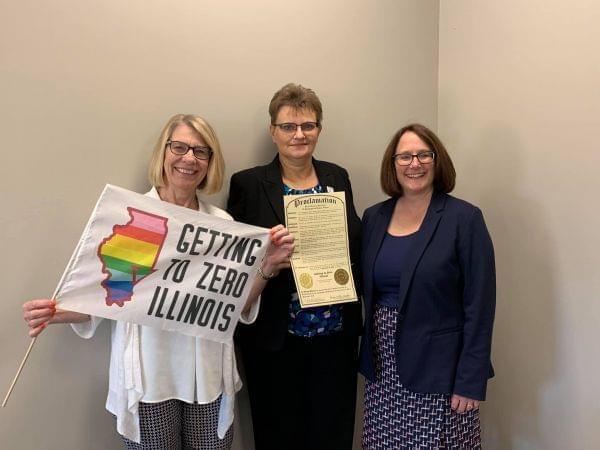C-U Mayors Endorse ‘Getting To Zero’ Plan To Eliminate HIV In Illinois

Urbana Mayor Diane Marlin (left) and Champaign Mayor Deborah Frank Feinen (right) pose with CUPHD Administrator Julie Pryde at a reception announcing the cities' endorsement of the "Getting To Zero" plan on September 23, 2019. Courtesy of Julie Pryde/CUPHD
City officials from both Champaign and Urbana have signed onto a plan to eliminate HIV in the region, as part of a statewide initiative in Illinois called “Getting To Zero.”
The initiative led by the AIDS Foundation of Chicago aims to reduce the number of new HIV cases in Illinois to less than 100 by the year 2030.
The program focuses on increasing access to a preventive medication known as Pre-Exposure Prophylaxis, or PrEP, and ensuring those who already have HIV get access to antiretroviral treatment to help prevent its spread.
CU Public Health District Administrator Julie Pryde said the District has been working on fighting the AIDS epidemic since the ‘80s.
Pryde said with the support of both Champaign Mayor Deb Feinen and Urbana Mayor Diane Marlin, public health workers will be able to step up efforts to address barriers to HIV treatment “to make sure that everybody has access to the medications, everybody has access to the information.”
The number of new HIV cases in Illinois dropped 28% from 2006 to 2015, according to a fact sheet compiled by the AIDS Foundation of Chicago. Additionally, mother-to-child transmission has been nearly eliminated in the state.
However, HIV continues to disproportionately affect black and Latino communities. Among those seeing an increase in HIV cases are black gay men and Latinos of all genders. More than three-quarters of women living with HIV are black.
Pryde said there’s a lot of work to do to address racial disparities in HIV treatment.
“We’re going to be working on eliminating stigma, dismantling racism, prioritizing trauma prevention and trauma-informed care,” she said. “We have to make sure that young people of color, and especially people who are in lower socioeconomic situations, are aware of this and are accessing these services.”
Pryde said she hopes people will reach out to the C-U Public Health District to get connected to resources in the community that can help anyone in need of treatment get it, regardless of ability to pay.
Follow Christine on Twitter: @CTHerman
Links
- Wildlife Photographer Thomas Mangelsen; Ending HIV In Illinois By 2030; Camp Kesem
- HIV Still Problematic In African Countries Like Uganda
- New National Trial Gives Hope to HIV Patients Who Need Organs
- HIV #StayInCare; #NeverTrump #NeverHillary; Political Outlook
- Obamacare Repeal Could Reverse Progress On HIV/AIDS Treatment And Prevention
- AIDS Scientists Encouraged By Antibodies That Hit Monkey Virus
- Illinois Politics; K-12 Education Report; World AIDS Day; Author Discusses ‘Make Someone Happy’
